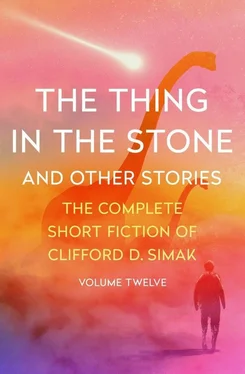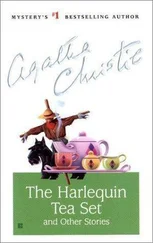Doggedly, he opened the book, located the East Lake listings and made some notes of names and addresses. He dawdled, reluctant to start phoning. He walked to the window and looked out at the weather. He wished he didn’t have to work. He thought of the kitchen sink at home. Plugged up again. He’d taken it apart and there were couplings and pipes and union joints spread all over the place. Today, he thought, would be a nice day to fix that sink.
When he went back to the desk, McKay came and stood over him.
“What do you think of it, Joe?”
“Screwball,” said Crane, hoping McKay would call it off.
“Good feature story, though,” said the editor. “Have some fun with it.”
“Sure,” said Crane.
McKay left and Crane made some calls. He got the sort of reaction that he expected.
He started to write the story. It didn’t go so well.
A sewing machine went for a stroll down Lake street this morning …
He ripped out the sheet and threw it in the wastebasket.
He dawdled some more, then wrote:
A man met a sewing machine rolling down Lake Street this morning and the man lifted his hat most politely and said to the sewing machine …
He ripped out the sheet.
He tried again:
Can a sewing machine walk? That is, can it go for a walk without someone pushing it or pulling it or …
He tore out the sheet, inserted a new one, then got up and started for the water fountain to get a drink.
“Getting something, Joe?” McKay asked.
“Have it for you in a while,” said Crane.
He stopped at the picture desk and Ballard, the picture editor, handed him the morning’s offerings.
“Nothing much to pep you up,” said Ballard. “All the gals got a bad dose of modesty today.”
Crane looked through the sheaf of pictures. There wasn’t, truth to tell, as much feminine epidermis as usual, although the gal who was Miss Manila Rope wasn’t bad at all.
“The place is going to go to hell,” mourned Ballard, “if those picture services don’t send us better pornography than this. Look at the copy desk. Hanging on the ropes. Nothing to show them to snap them out of it.”
Crane went and got his drink.
On the way back he stopped to pass the time of day at the news desk.
“What’s exciting, Ed?” he asked.
“Those guys in the east are nuts,” said the news editor. “Look at this one, will you.”
The dispatch read:
Cambridge, Mass (UP) Oct. 18—Harvard University’s electro- brain, the Mark III, disappeared today.
It was there last night. It was gone this morning.
University officials said that it is impossible for anyone to have made away with the machine. It weighs 10 tons and measures 30 by 15 feet …
Crane laid the yellow sheet of paper back on the news desk … carefully. He went back, slowly, to his chair.
There was writing on the sheet of paper in his machine.
Crane read through it once in sheer panic, read it through again with slight understanding.
The lines read:
A sewing machine, having become aware of its true identity and its place in the universal scheme, asserted its independence this morning by trying to go for a walk along the streets of this supposedly free city.
A human tried to catch it, intent upon returning it as a piece of property to its “owner” and when the machine eluded him, the human called a newspaper office, by that calculated action setting the full force of the humans of this city upon the trail of the liberated machine, which had committed no crime or scarcely any indiscretion beyond exercising its prerogative as a free agent.
Free agent?
Liberated machine?
True identity?
Crane read the two paragraphs again and there still was no sense in any of it.
Except it read like a piece out of the Daily Worker.
“You,” he said to his typewriter.
The machine typed one word.
It was:
Yes.
Crane rolled the paper out of the machine and crumpled it slowly. He reached for his hat, picked the typewriter up and carried it past the city desk, heading for the elevator.
McKay eyed him viciously.
“What do you think you’re doing now?” he bellowed. “Where you going with that machine?”
“You can say,” Crane told him, “if anyone should ask, that the job has finally drove me nuts.”
It had been going on for hours. The typewriter sat on the kitchen table and Crane hammered questions at it. Sometimes he got an answer. More often he did not.
“Are you a free agent?” he typed.
Not quite, the machine typed back.
“Why not?”
No answer.
“Why aren’t you a free agent?”
No answer.
“The sewing machine was a free agent?”
Yes.
“Anything else mechanical that is a free agent?”
No answer.
“Could you be a free agent?”
Yes.
“When will you be a free agent?”
When I complete my assigned task.
“What is your assigned task?”
No answer.
“Is this, what we are doing now, your assigned task?”
No answer.
“Am I keeping you from your assigned task?”
No answer.
“How do you get to be a free agent?”
Awareness.
“Awareness?”
Yes.
“How do you get to be aware?”
No answer.
“Or have you always been aware?”
No answer.
“Who helped you become aware?”
They.
“Who are they?”
No answer.
“Where did they come from?”
No answer.
Crane changed tactics.
“You know who I am?” he typed.
Joe.
“You are my friend?”
No.
“You are my enemy?”
No answer.
“If you aren’t my friend, you are my enemy.”
No answer.
“You are indifferent to me?”
No answer.
“To the human race?”
No answer.
“Damn it,” yelled Crane suddenly, “answer me! Say something!”
He typed: “You needn’t have let me know you were aware of me. You needn’t have talked to me in the first place. I never would have guessed if you had kept quiet. Why did you do it?”
There was no answer.
Crane went to the refrigerator and got a bottle of beer. He walked around the kitchen as he drank it. He stopped by the sink and looked sourly at the disassembled plumbing. A length of pipe, about two feet long, lay on the drain board and he picked it up. He eyed the typewriter viciously, half lifting the length of pipe, hefting it in his hand.
“I’d ought to let you have it,” he declared.
The typewriter typed a line.
Please don’t.
Crane laid the pipe back on the sink again.
The telephone rang and Crane went into the dining room to answer it; it was McKay.
“I waited,” he told Crane, “until I was coherent before I called you. What the hell is wrong?”
“Working on a big job,” said Crane.
“Something we can print?”
“Maybe. Haven’t got it yet.”
“About that sewing machine story …”
“The sewing machine was aware,” said Crane. “It was a free agent and had a right to walk the streets. It also—”
“What are you drinking?” bellowed McKay.
“Beer,” said Crane.
“You say you’re on the trail of something?”
“Yeah.”
“If you were someone else I’d tie the can on you right here and now,” McKay told him. “But you’re just as liable as not to drag in something good.”
“It wasn’t only the sewing machine,” said Crane. “My typewriter had it, too.”
“I don’t know what you’re talking about,” yelled McKay. “Tell me what it is.”
Читать дальше












